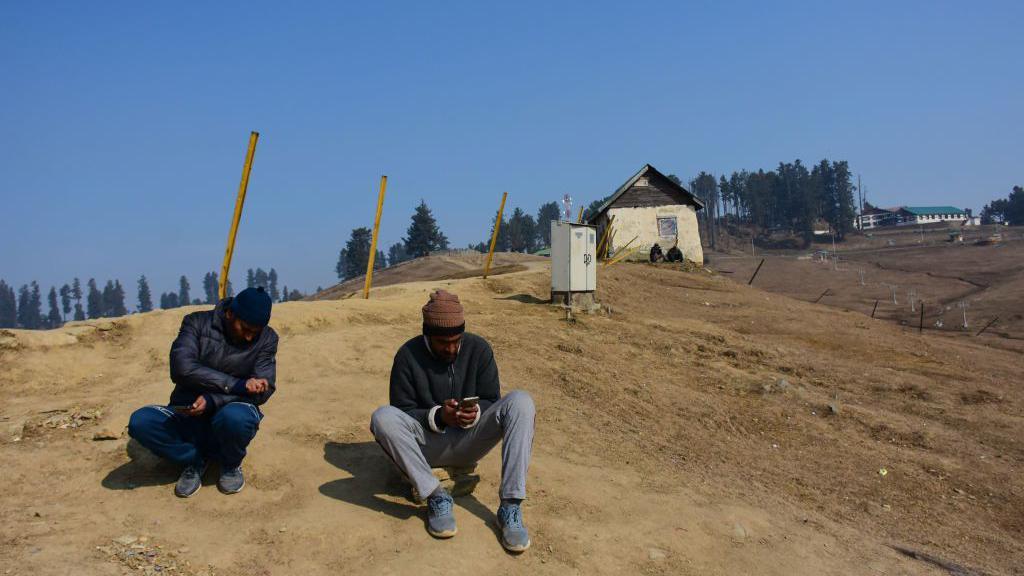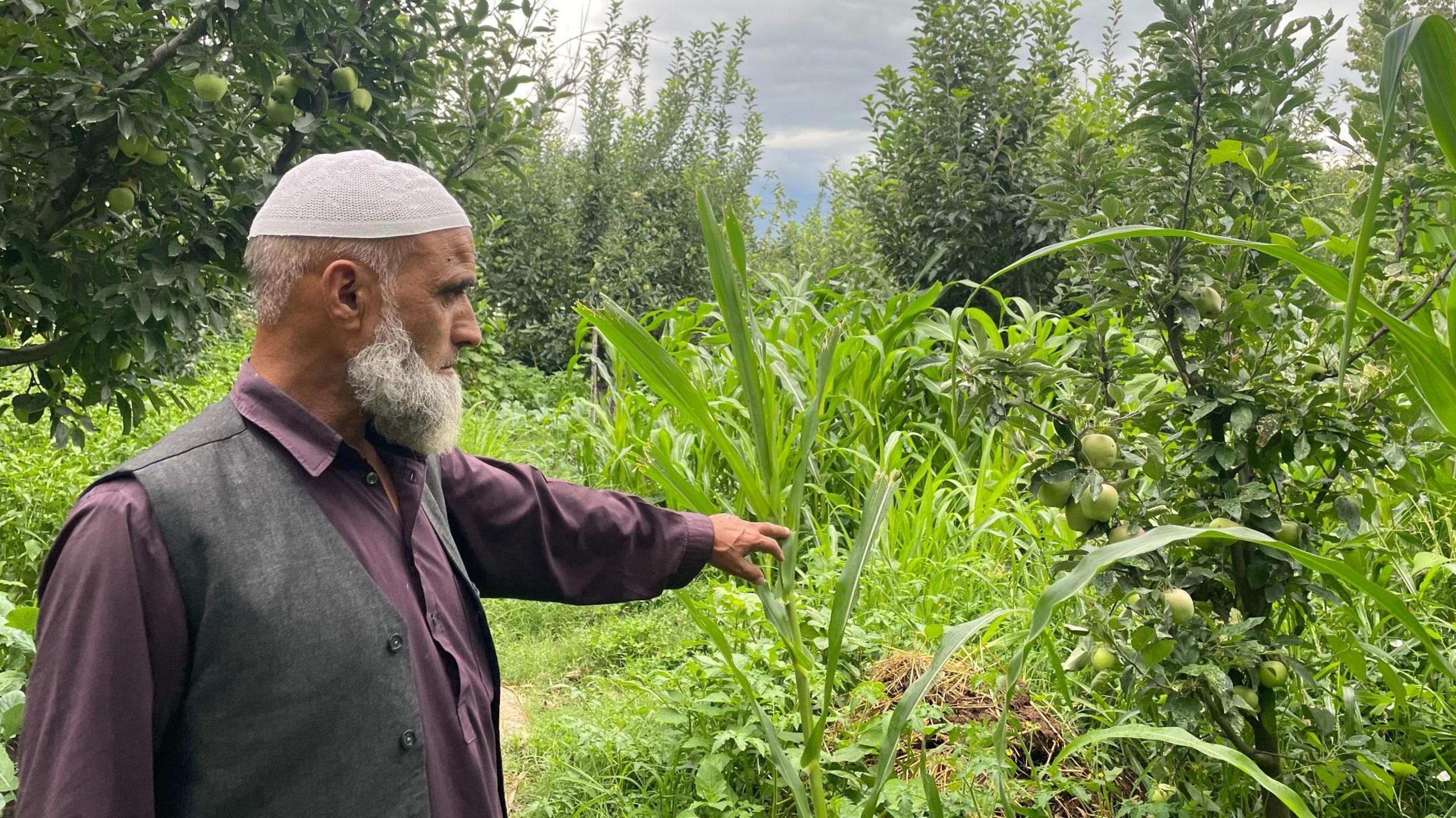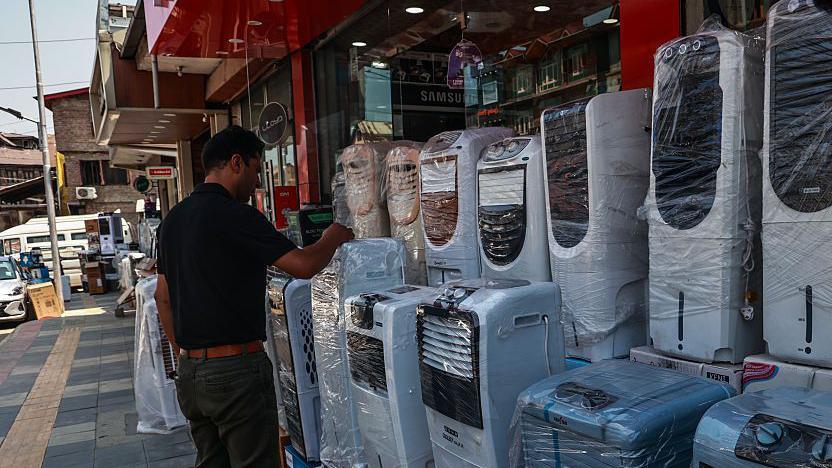Kashmir's growing heat crisis hits health and harvests

An unrelenting heatwave has gripped Kashmir over the last few months
- Published
Zaina Begum stood helplessly next to her withering paddy field.
A farmer in Indian-administered Kashmir's Pulwama district, she had been waiting for rainfall for more than a month, hoping to save her crop from dying.
So when it finally rained earlier this week, she was hopeful.
"But it was already too late by then," she said. "Our land had completely dried up."
An intense heatwave has gripped Kashmir, a picturesque Himalayan region dotted with glaciers and known for its cool climate, as temperatures have soared to record-breaking levels this month.
The region recorded its highest daytime temperature in 70 years at 37.4C (99.32F) - at least 7C above the seasonal average.
The valley also witnessed its hottest June in 50 years, prompting authorities to shut down schools and colleges for two weeks.
Some respite came earlier this week after parts of the region received heavy rains, but experts say the relief is temporary and warn of even higher temperatures in the coming days.
The changing weather patterns have had a devastating impact on locals, most of whom rely on farming for their livelihoods. Many are struggling to stay in the business, while others complain about a drop in the quality of the produce, causing them huge losses.
Ms Begum's family has been cultivating paddy - a highly water-intensive crop - for decades on their one-acre land (4046 sq m) in Chersoo village.
But they haven't had a single batch of healthy harvest in the last five years, as rains have become progressively more erratic, she said.
"This summer, it feels like our worst fears have come true," she added. "We have nothing left."

In January 2024, the tourist town of Gulmarg saw a dry and snowless winter as snowfall was delayed for months
According to a 2021 study, the maximum temperature in the Kashmir rose by 2C between 1980 and 2020, indicating an average rise of 0.5C rise per decade.
Mukhtar Ahmad, head of the Indian weather department's centre in Srinagar city, said the region had already witnessed three heatwaves this season, causing major rivers and streams to dry up.
The signs of damage were visible everywhere.
In Bandipore district, rows of wilted apple trees dot Ali Mohammad's 15-acre field.
Twenty years ago, he decided to turn land, where he grew paddy, into an apple orchard because he felt the weather and water supplies had become too unreliable for growing rice.
But now, even his apple crop - which typically requires less water - is struggling to survive.
"The orchards need water at least three times a month, but for the last two months there was no rain and the irrigation canals dried up," he said.
The scorching heat has also taken a toll on residents, who are unaccustomed to living in such high temperatures.
"I have never witnessed such an intense heatwave in my life," said 63-year-old Parveez Ahmad, who lives in northern Kashmir.
A few days ago, Mr Ahmad had to be rushed to the hospital after he complained of severe breathlessness.
"The doctors told me it was caused by the heat and humidity," he said.
Environmentalists say that climate change has been impacting the region, causing extreme weather events and prolonged dry spells in both winter and summer.
Last year, the snow-clad mountains in the region stayed oddly brown and barren for months, after a prolonged delay in the annual snowfall.

Erratic weather forced Ali Mohammad to grow apples instead of rice two decades ago - but even that has become a challenge
While warmer winters have led to reduced snowfall, hotter summers have sped up the melting of glaciers, disrupting the availability of water and putting human health and crops at risk, said Mohammad Farooq Azam, a glaciologist and hydrologist.
"These trends are not just seasonal anomalies - they represent a systemic shift that could have long-term consequences for water security, agriculture and biodiversity in Kashmir," Mr Azam added.
Mr Azam explained that most of Kashmir's winter rain and snow come from western disturbances - storms that form over the Mediterranean and move eastward. But these systems have become weaker and less frequent, leading to reduced snowfall and delays in snowmelt.
"This exposes the bare ground sooner than usual, which absorbs more heat. As glaciers shrink and snow cover reduces, the land reflects less sunlight and traps more heat, making the region even warmer," he said.
Jasia Bashir, a professor at the Islamic University of Science and Technology in Awantipora district, points out that Kashmir contributes very little to global carbon emissions, as it has limited industry and relies mostly on agriculture and tourism.
Yet, the region is being hit hard by climate change - making it a victim of a crisis it played little part in creating, she said.

Rising temperatures are pushing more people to buy air conditioners in the valley for the first time
"This tells you how climate change is a global phenomenon, not restricted to any particular region."
That said, the region has also witnessed rapid urbanisation in recent years.
Vast farmlands and forests have been replaced with concrete buildings, reducing the region's ability to naturally regulate the local climate.
According to a report by Global Forest Watch (GFW), the wider Jammu and Kashmir region lost nearly 0.39% of its total tree cover between 2001 and 2023 due to deforestation and forest fires.
In addition, government figures reveal that more than 600,000 trees have been felled in Kashmir over the last five years after being identified as river encroachments.
Ms Bashir said urban areas of Kashmir were also experiencing higher energy demands, especially for air conditioners, which has increased the greenhouse gas emissions.
"This sets off a vicious cycle: rising temperatures lead to greater energy use, which fuels more emissions and further warming," she added.
Critics say that despite the growing risks, environmental issues rarely make headlines and are still not a priority for Kashmir's politicians.
Tanvir Sadiq, the spokesperson for the region's elected government, denied this and said the administration was taking the problem of climate change "very seriously".
"Climate change is a global phenomenon and the government alone cannot tackle it," he added. "Still, we are exploring all available options to minimise its impact on the people."
But for farmers like Ms Begum, any action must happen quickly.
"Otherwise, we will be doomed," she said.
Follow BBC News India on Instagram, external, YouTube,, external Twitter, external and Facebook, external.